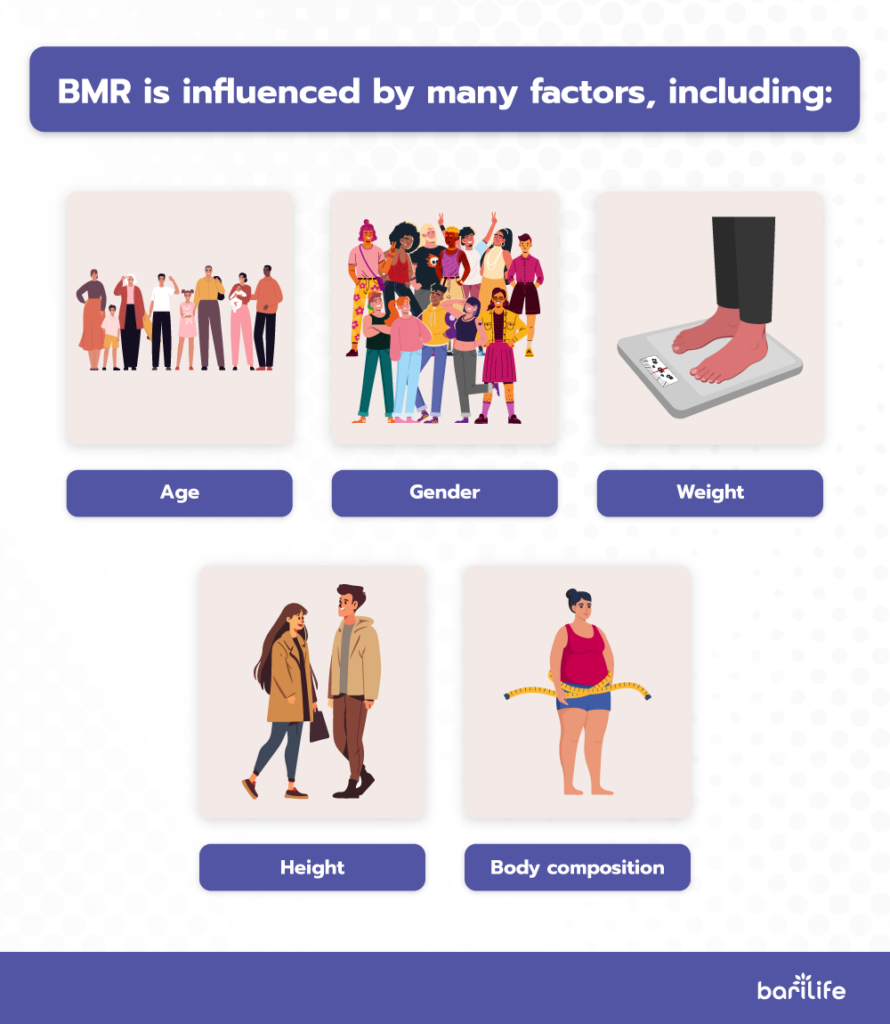Basal Metabolic Rate (BMR) is a crucial factor in understanding your body’s energy needs. It represents the number of calories your body requires to maintain basic physiological functions, such as breathing, circulation, and cell production, while at rest. Knowing your BMR can help you make informed decisions about your diet and weight loss goals
Calculating your BMR involves using mathematical formulas that take into account factors such as age, gender, weight, height, and body composition. By understanding how these factors affect your BMR, you can tailor your diet and exercise plan to achieve your weight loss goals more effectively.
This article will explore the significance of BMR in weight loss, how it is calculated, and the factors that can affect it. We will also discuss how you can use your BMR to create a personalized weight loss plan that suits your needs and lifestyle.
What is BMR?
BMR is the amount of energy your body needs to maintain basic physiological functions while at rest, such as:
- Breathing
- Circulation
- Cell production
- Nutrient processing
BMR is influenced by many factors including:

It’s an essential component in understanding how many calories your body needs each day to maintain its current weight. Let’s dive into how this value is calculated.
How is BMR calculated?
BMR is typically calculated using mathematical formulas based on factors such as age, gender, weight, height, and activity level.
One common formula is the Harris-Benedict equation, which was named after its creators, James Arthur Harris and Francis Gano Benedict, who developed the equation back in 1918. The original equation was later revised in 1984 by Roza and Shizgal to improve its accuracy.
For men: BMR = 88.362 + (13.397 x weight in kg) + (4.799 x height in cm) – (5.677 x age in years)
For women: BMR = 447.593 + (9.247 x weight in kg) + (3.098 x height in cm) – (4.330 x age in years)
This formula provides an estimate of the number of calories your body needs at rest. Keep in mind that this is a general estimation, and individual metabolism can vary.
11 factors that affect BMR?
There are many factors that affect one’s BMR. Let’s take a deep dive into each of these factors.

1. Age: As you age, your metabolism naturally slows down. This is partly due to a decrease in muscle mass and an increase in body fat percentage. Muscle tissue burns more calories at rest than fat tissue, so a decline in muscle mass can lead to a lower BMR.
2. Gender: Men typically have a higher BMR than women. This is because men tend to have more muscle mass and lower body fat percentages than women, which means they burn more calories at rest.

3. Body composition: Your body composition, specifically the amount of muscle mass versus fat mass, plays a significant role in determining your BMR. Muscle tissue is more metabolically active than fat tissue, so people with more muscle mass tend to have a higher BMR.
4. Weight: Heavier individuals generally have a higher BMR than lighter individuals. This is because it takes more energy to maintain a larger body, including the extra muscle, bone, and tissue.
5. Height: Taller individuals tend to have a higher BMR than shorter individuals. This is because taller people have more surface area and thus lose more heat, which requires more energy.

6. Hormones: Thyroid hormones, such as thyroxine, play a crucial role in regulating metabolism. An overactive thyroid gland, also known as hyperthyroidism, can lead to a higher BMR, while an underactive thyroid gland, referred to as hypothyroidism, can lead to a lower BMR.
7. Body temperature: A higher body temperature can increase BMR because the body requires more energy to maintain a higher temperature. This is why your BMR may increase slightly when you have a fever.
8. Fasting and starvation: Prolonged fasting or starvation can decrease BMR as the body tries to conserve energy. This is a survival mechanism that allows the body to function on fewer calories during times of scarcity.
9. Illness and stress: Certain illnesses and stress can increase BMR as the body works harder to heal and cope with stressors. This increased metabolic rate is part of the body’s natural response to illness and stress.
10. Genetics: Some people may have naturally higher or lower BMRs due to genetic factors. These factors can include things like the efficiency of their metabolism and how their body stores and uses energy.
11. Fidgeting: This includes small, spontaneous movements like tapping your foot or playing with your hair, can increase your energy expenditure, albeit to a small extent. This is because these movements require muscle contractions, which burn calories.

BMR and weight loss
BMR plays a significant role in weight loss because it represents the number of calories your body needs to maintain basic functions at rest. Knowing your BMR can help you determine how many calories you should consume or burn off to lose weight.
Calorie Deficit
To shed those extra pounds, it’s all about the calorie game. You need to eat fewer calories than your body burns, creating what’s called a calorie deficit. Your BMR gives you a solid starting point, indicating how many calories your body needs at rest. By aiming to eat just a bit fewer calories than your BMR, you can create a calorie deficit that’s safe and effective for weight loss. It’s like giving your body a nudge to start using up those stored calories, helping you reach your weight loss goals in a steady and sustainable way.
For example, if your BMR is 2000 calories per day and you want to create a deficit of 500 calories per day, you would aim to consume 1500 calories per day. This deficit would result in a weight loss of about 1 pound per week.
Protein Intake
When embarking on a weight loss journey, especially for individuals who have undergone bariatric surgery, prioritizing protein intake is crucial. Protein plays a significant role in the recovery process post-surgery and is essential for maintaining muscle mass, which can be at risk during rapid weight loss.
Consuming an adequate amount of protein helps promote satiety, keeping hunger at bay and aiding in weight loss efforts. Additionally, protein is important for supporting metabolic function and overall health.
The protein needs of individuals can vary based on several factors, including age, sex, weight, muscle mass, physical activity level, and health status. Here’s a breakdown of some key factors:
- Age – Protein needs tend to be higher during periods of growth, such as adolescence. Older adults may also have slightly higher protein needs to help maintain muscle mass.
- Sex – Generally, men have higher protein needs than women, due to differences in muscle mass and hormone levels.
- Weight- Protein needs are often calculated based on body weight, with heavier individuals requiring more protein to maintain muscle mass.
- Muscle Mass – Individuals with more muscle mass, such as athletes or bodybuilders, may require more protein to support muscle repair and growth.
- Physical Activity Level – People who are more physically active may need more protein to support muscle recovery.
For individuals who have undergone bariatric surgery, protein needs may be higher than average due to the reduced stomach capacity and potential malabsorption issues. Therefore, incorporating protein-rich foods such as lean meats, poultry, fish, eggs, dairy products, legumes, and tofu into meals and snacks is essential.
Here are a list of some high protein foods:
- Meats including poultry, such as chicken, turkey, lean beef, pork loin
- Fish and shellfish, including salmon, tuna, trout, shrimp, crab, lobster
- Eggs
- Dairy such as milk, cheese, yogurt
- Legumes including black beans, chickpeas, lentils
- Soy products like tofu, tempeh, edamame
- Nuts and seeds sucha s almonds, chia seeds, hemp seeds
Protein bars or shakes may also be recommended to help meet daily protein goals, especially if solid foods are challenging to consume. However, it’s important to consult with a healthcare provider or registered dietitian to determine the appropriate amount of protein for individual needs and ensure a balanced diet is maintained.
Mocha Cream Protein Pudding/Shake
Who doesn’t love the taste and aroma of rich and delicious mocha cream?! Enjoy Bari Life Mocha Cream Protein Pudding/Shake Packets as a delicious breakfast or dessert for only 100 calories and 15 grams of filling protein! (7/box)
In stock
Exercise
While diet plays a significant role in weight loss, exercise can also help create a calorie deficit and improve overall health. Combining a calorie-controlled diet with regular physical activity can enhance weight loss efforts.
Yoga: Burns about 180-300 calories per hour, depending on the style and intensity.
Strength Training: Burns about 210-310 calories per hour, depending on intensity.
Walking (3.5 mph): Burns about 280-320 calories per hour.
Dancing (moderate): Burns about 330-500 calories per hour.
Hiking: Burns about 430-550 calories per hour, depending on intensity and terrain.
Swimming (moderate): Burns about 470-590 calories per hour.
Jogging/Running: Burns about 590-930 calories per hour, depending on speed and intensity.
Cycling (12-14 mph): Burns about 590-750 calories per hour.
If you’re unsure how to incorporate your BMR into your weight loss plan, consider consulting with a registered dietitian or healthcare provider. They can help you create a personalized plan based on your BMR, goals, and lifestyle.




What are your tips and tricks to post-bariatric success?